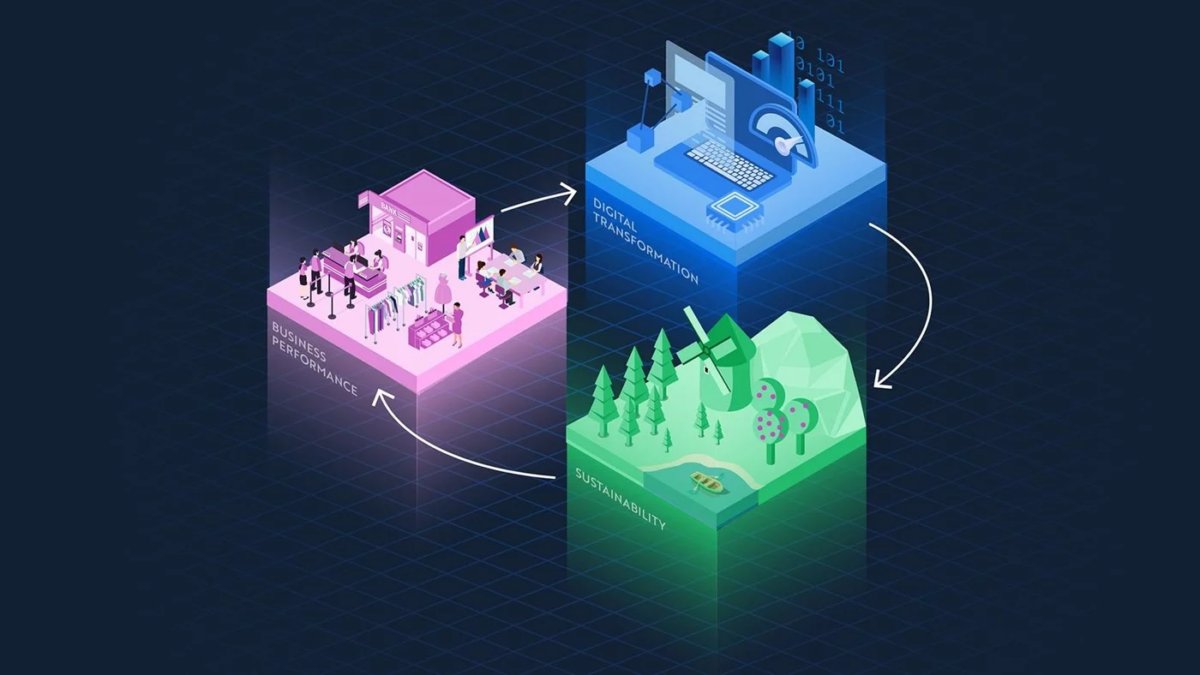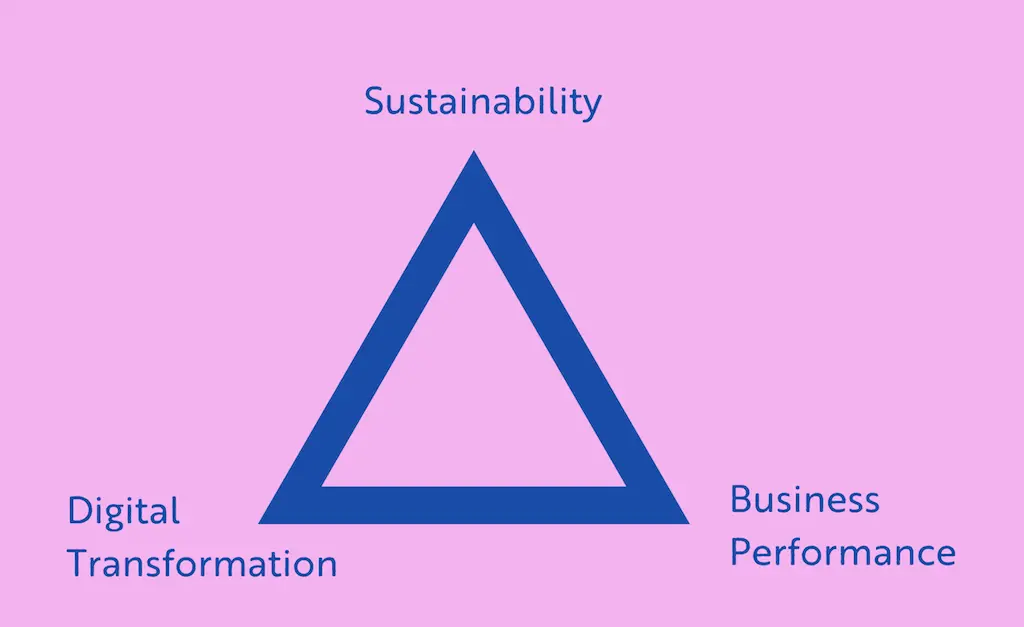
At Digitopia we see digital transformation as instrumental in achieving growth in the modern world, with one of its key applications being the ways it can revolutionise how organisations approach sustainability.
In the wake of COVID, organisations are experiencing a rapid acceleration of innovation in their business models and strategy, forced to look ahead to the future and anticipate the new structure of society after its greatest shake up in decades. Hard lessons have been learned from the vulnerability businesses felt following the pandemic, with resilience and sustainability of business models emerging as key points of discussion across many a board room. As priorities begin to shift towards long-term preservation, focus inevitably turns towards digitalization.

We view sustainability as the ‘third pillar’ in business success, an integral component in combination with digital transformation to navigate the uncertainty of the market and deliver business success in the decades to come.
Digital Transformation and Sustainability are interlinked
The interdependency of digital transformation and sustainability is widely acknowledged, both factors simultaneously impacting business performance more and more as time goes on. The sustainability of a business relies on the digital intelligence and systems that they have access to, and likewise an organisation’s digital strategy is affected by their goals for a more sustainable future.
Both factors weigh heavily on the needs and actions of key stakeholders, from investor perspectives and decision making, to consumer purchasing behaviours, to the preservation of our very planet itself.
The Impact on our Planet
Digital transformation completely changes the way that organisations manage their presence in the world. Significant strides in technology allow for innovative new methods of reducing environmental impact and enhancing resilience in predicting and adapting to changes in our world. Companies are beginning to utilise technologies like blockchain to effectively track and understand the environmental impact of their actions at every step of the production journey, maintaining environmental standards while protecting the information from tampering and passing it directly to consumers to inform their decision making. The Carbon Tracing Platform is an example initiative designed to enhance the traceability of carbon usage across the supply chain for a range of mining and metal organisations including Tata Steel, Glencore and many more.
Artificial intelligence and machine learning are leading to new and innovative ways for businesses to support the world, with value being unlocked through AI to design out waste for food and regenerating natural systems potentially being worth up to $127 billion by 2030. AI technology is also effective in aiding with disaster response, reducing air pollution and improving the affordability and accessibility of renewable energy and energy-efficient construction. Machine learning is similarly being applied to automate processes that have environmental impact, with companies like Shell leading the charge on developing predictive maintenance technologies to extend equipment operational life and reliability.
The increasing prevalence of Internet of Things (IoT) devices in society are enabling organisations to gather data, monitor production processes and further assess the environmental impact of their behaviour. The World Economic Forum labels IoT as “one of the largest enablers for responsible digital transformation” which could contribute up to $14 trillion of economic value by 2030, while potentially saving 1.3 trillion MWh of energy in the same time period among a myriad of other benefits.
It is clear then that through the application of digital technologies organisations can transform their business in ways that greatly improve their sustainability and reduce waste. The question is, why would they do this? Historically companies have seen less incentive to make drastic investments in technology, but changing behavioural trends are already causing boardrooms to reassess this view.
Changing Perspectives
More than ever before consumers are aware of the threats to the environment, which is bleeding through into the decisions they make daily with increasing frequency. Consumers are selecting organisations that embrace responsibility towards the planet, leading to selective purchasing and support of products based on environmental interest.
A third of participants in a recent survey stated that they had stopped purchasing from certain brands because of an ethical or sustainability-related concern with the company, indicating the potential for massive swings in company profitability in a relatively short time period should they fail to keep up with shifting behaviour of rivals in the market. In particular these trends affect purchases that consumers deem necessary and buy frequently such as food, but can also have a major impact on other industries such as footwear and clothes.
Sustainable Investment
Investors are also turning their gaze towards sustainability and allowing the CSR decisions of organisations to influence their choice of portfolio far more than could have been anticipated 10 years ago. The Principles of Responsible Investment represents a union of investors who pledge to integrate ESG values into their investment choices, citing reduced risk and higher long-term returns as key decision-making factors. 58% of Institutional investors highlighted investing in line with ESG values as key to their decision-making process.
Companies with stronger ESG records are generally experiencing higher returns and more likely to become high-quality stocks. NVIDIA currently has the highest ESG rating due to its rigorous processes to avoid using conflict materials in its graphics cards and chips and reaps the benefits of increased shareholder advocacy as a result. In response to this trend, 86% of S&P 500 organisations published sustainability reports in 2018, indiciating a desire to attract investor capital from those with a passion for social responsibility. Despite this, just 35% of the companies surveyed actually achieved their sustainable digital transformation objectives, indicating a gap between desire and outcome that could potentially damage their attractiveness of investment in the future.
What does it mean for you?
Public and corporate appetite for sustainable change has never been stronger, and with digital transformation becoming necessary for sustainable business practice, its importance has never been greater.
True sustainable practice comes from effective measurement of performance and progress, creating transparency in processes to fully understand the impact of business actions on our environment. To successfully achieve this, applying the right digital tools and systems is critical. Measurement is key, and understanding the digital maturity of an organization creates the backbone for future digital transformation strategy.
The signs are clear, digital transformation is here to deliver a sustainable future. We call on business leaders to reflect on how well they understand the digital maturity of their organisations and act today to stay relevant in the modern era of business. Failing to act today will have major implications to the survival of any organization regardless of sector in the new digital, sustainable age.
In this series of articles we will be investigating how a variety of different industry leaders are already making waves by achieving digital transformation enlightenment, and what your organization can do today to secure its place in the digital landscape of tomorrow.

